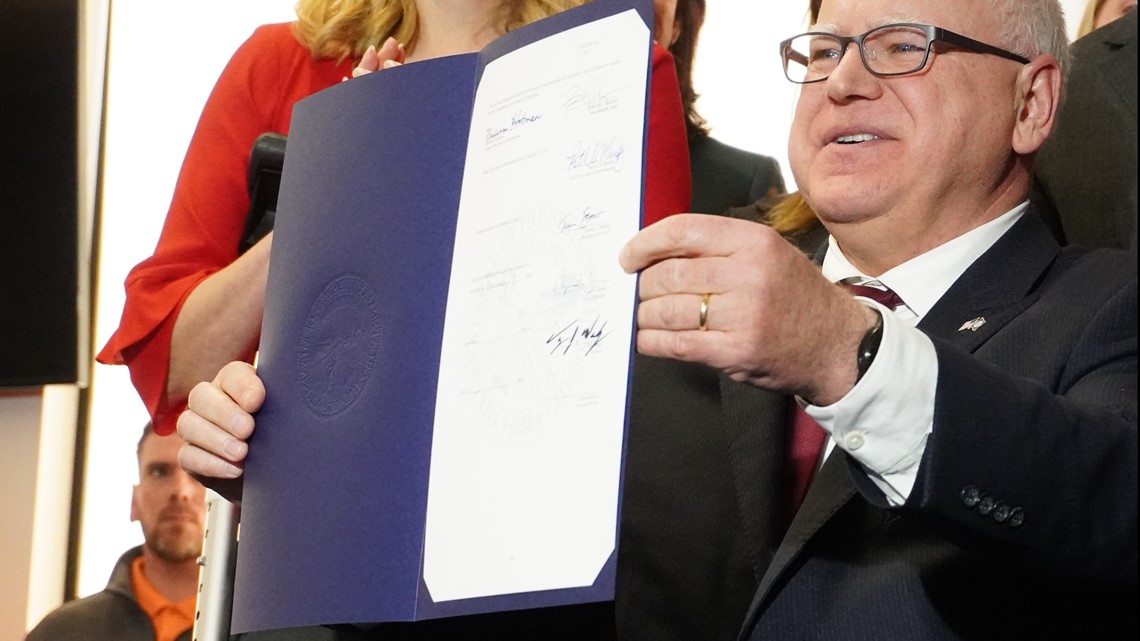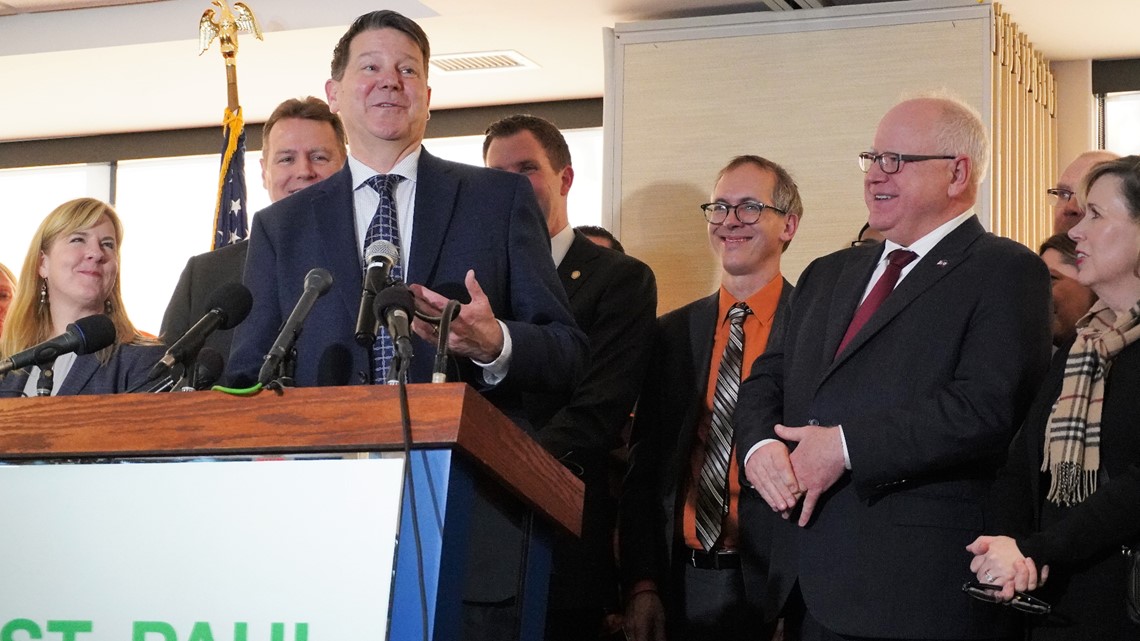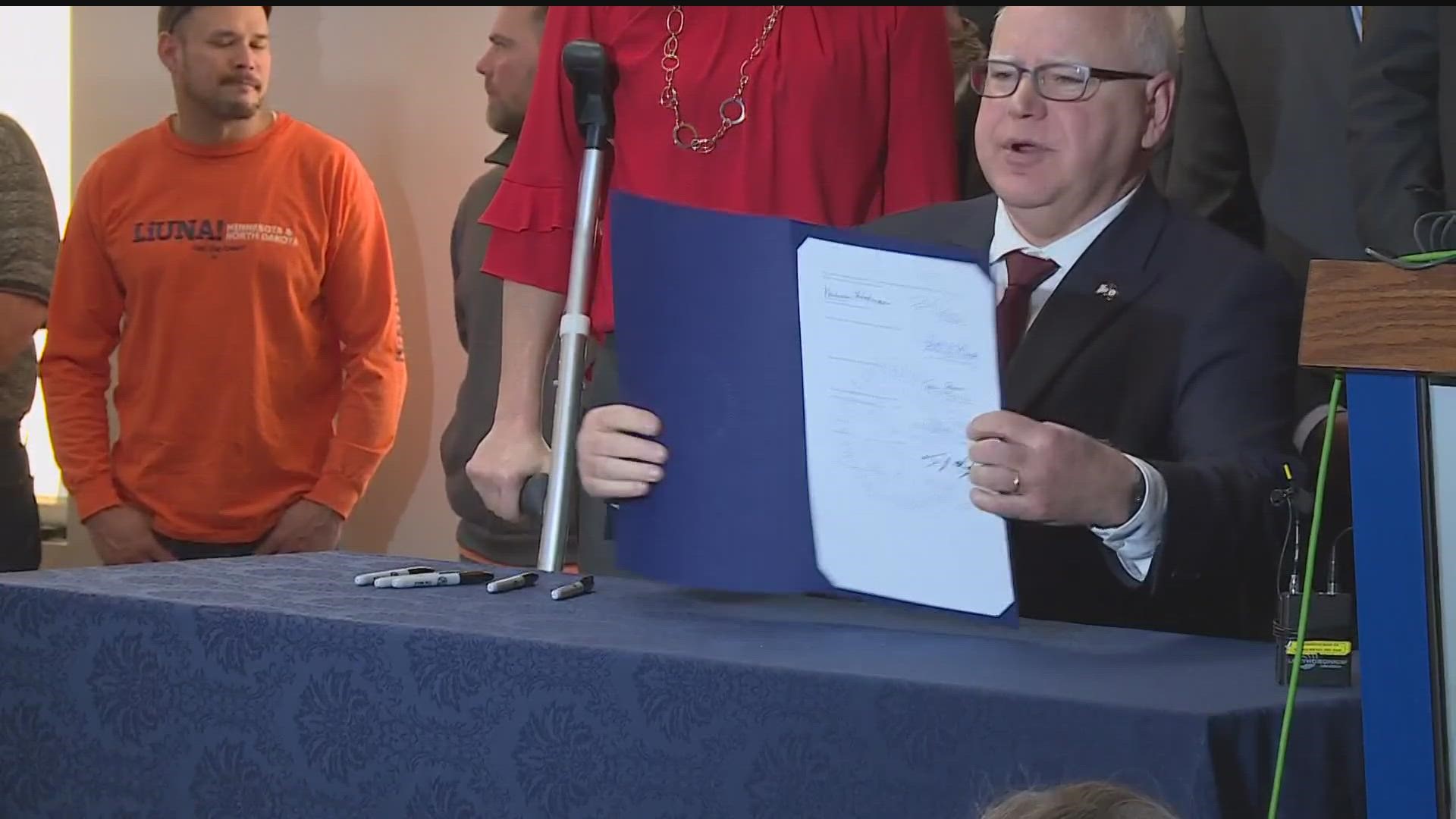ST PAUL, Minn. — Gov. Tim Walz signed a bill Tuesday designed to cut carbon emissions statewide while creating more clean-energy jobs.
With the signing of the bill, Minnesota utilities are now obligated to transition to 100% carbon-free electricity by 2040 to step up the fight against climate change.
"What this bill does and makes it very clear that no longer is this debate about moving towards clean energy future on sustainability of the planet and our economic future are no longer divided, they run hand in hand," said Gov. Walz prior to Tuesday's signing.
According to the Clean Energy States Alliance, 21 other states plus the District of Columbia and Puerto Rico have already established some kind of 100% clean-energy standards or goals, most with target dates between 2040 and 2050.
Minnesota's previous standard, set in 2007 by a Democratic-controlled Legislature and Republican Gov. Tim Pawlenty, set a goal of reducing overall statewide greenhouse emissions to at least 15% below 2005 levels by 2015, 30% by 2025 and 80% by 2050.
State regulators reported last week that Minnesota's greenhouse gas emissions declined by 23% between 2005 and 2020 and said the state was on track to achieve 30% by 2025. The biggest drop was in power generation, where emissions fell 54% amid the switch from coal to renewable energy.


“The 100% Clean Energy bill is a great example of how we can address one of our largest sources of climate pollution while creating jobs and ensuring Minnesotan’s energy remains reliable and affordable," said Conservation Minnesota's Executive Director Paul Austin in a press release. "We applaud Governor Walz and chief authors Senator Nick Frentz and Representative Jamie Long for their steadfast commitment to protecting our air, climate, and Great Outdoors. This bill shows how states can continue to move climate goals forward, and we look forward to continuing to advocate for the climate solutions Minnesotans need.”
The bill aims to further shift utilities away from fossil fuels to wind and solar, but it also allows them to use hydropower, biomass, hydrogen and existing nuclear plants to go carbon-free. Utilities that can’t quit coal or gas on their own could ask regulators to let them use “off ramps” to delay compliance, or they could use renewable energy credits to make up the difference.
"Minnesota is not going to wait any longer, Minnesotans are not going to wait any longer," said Walz. "They've made it clear — they make it clear with their voices, they make it clear with their advocacy, they make it clear with their votes — that they expect movement around climate change to happen and it is happening today."
Minnesota’s biggest utility, Xcel Energy, supports the legislation, saying it fits with the company's own goals, even though officials say they're not exactly sure yet how they’ll get all the way to carbon-free by 2040. But the state’s smaller rural electric cooperatives and municipal power systems say it will be a lot harder for them and that the costs to their customers will be high.
“In the years ahead, we will replace coal generation with wind and solar, extend the use of carbon-free nuclear energy, and explore new energy storage technologies,” said Chris Clark, president, Xcel Energy–Minnesota, North Dakota and South Dakota. “As we continue the energy transition, we remain committed to supporting the communities our facilities are located in and providing all of our customers with safe, reliable and affordable energy.”


Republican North Dakota Gov. Doug Burgum and other top officials in his state threatened last week to sue Minnesota if the bill is enacted, saying it would prevent North Dakota utilities from continuing to export power generated from coal and gas to Minnesota.
GOP critics in Minnesota have dubbed it a “blackout bill,” saying that it will undermine the reliability of the state’s power grid — especially on the coldest winter nights and hottest summer days — in addition to forcing consumers to pay higher energy costs.
"What the Governor criticizes as 'Gridlock' is the constitutional restraint on unlimited government power – what our Founders described as the tyranny of the Majority. Broad far-reaching legislation, such as the Governor’s 'Clean Energy Bill', should not be adopted on slim partisan majorities," said Minnesota GOP Chairman David Hann in a statement. "Republicans, and all Minnesotans, support clean energy but trying to force the entire economy to function on 100% renewable energy overnight is foolishness of the highest order. Republicans offered an 'all of the above' approach to provide cleaner energy in Minnesota while making sure we have a safety net of reliable and proven energy sources. Every single Democrat voted against it.
"By signing the 'Blackout Bill' into law, Governor Walz and the DFL are putting one of the coldest states in the nation on a path to rolling blackouts and energy uncertainty. Our economy depends on affordable, reliable energy. Minnesotans want common sense bi-partisan solutions to the challenges we face. Governor Walz and Democrats are failing to listen to all Minnesotans.”
Watch more Minnesota politics:
Watch the latest political coverage from the Land of 10,000 Lakes in our YouTube playlist:

